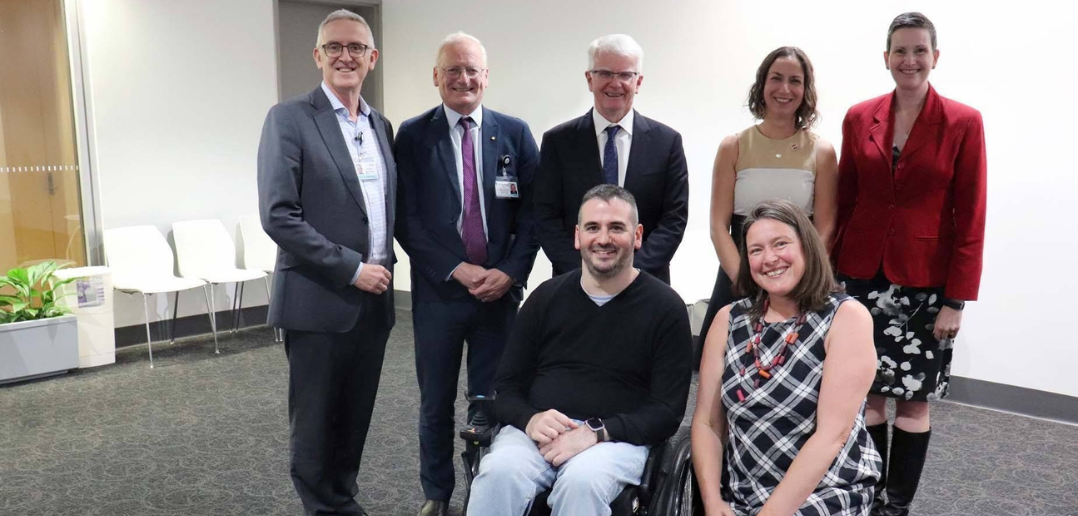Inclusive project tackles invisible disability

Source: http://phnews.org.au/
16/06/23
What is the best way to treat multiple sclerosis (MS) – a complex, sometimes ‘invisible’ neurological disease that evolves differently in patients and often elicits unpredictable responses to traditional therapies?
A new partnership between Sydney Adventist Hospital and The Australian National University (ANU) is seeking to address that question and give people diagnosed with the condition a greater say in their care.
The ANU’s MS Our Health in Our Hands (OHIOH) initiative aims to bring together researchers, clinicians and people with lived experience of the disease to develop new methods of personalised treatment.
New South Wales’ largest private hospital is hosting the Sydney contribution to the research project, as a new sister site to the ANU’s Canberra clinic.
“I remember the days when the only treatment for MS was intramuscular dexamethasone,” said Sydney Adventist Hospital’s Director of Research, Professor Geoffrey Herkes.
“Thankfully times have changed. Through the hard work of researchers, clinicians and people living with MS who have driven the research, we now know a lot more about MS, and have many more treatment options,” the neurologist added.
“However further research is crucial to improve the way we detect, treat and ultimately prevent MS from progressing.”
MS attacks the myelin sheath that protects the body’s nerves, making them unable to communicate messages from the brain.
It causes symptoms such as pain and loss of motor function and sensation and affects limb movement, vision, memory, and fatigue levels.
A wide array of treatments is now available, but it is difficult to determine which is most suitable for individual patients.
“We want to find ways to monitor MS more closely with non-invasive or minimally-invasive approaches,” said Associate Professor Anne Bruestle, the MS Research Lead in OHIOH since 2017 and its Chair since 2022.
“Being able to identify biomarkers that could be measured frequently will help clinicians better monitor the effectiveness of treatment.”
The OHIOH study cohort is a 50:50 split between people diagnosed with MS and those not while combining the expertise of researchers, medical specialists and clinicians across disciplines including physics, engineering, chemistry, data and laboratory research.
They are seeking to develop new and more frequent ways of monitoring MS attacks on the brain, spinal cord and optic nerves – known as ‘insults’ – which are usually only detectable after annual MRI scans.
The study team also hopes to develop minimally-invasive sensors that register patients' attacks as they happen, away from the hospital.
“That way we’ll have earlier detection of relapse activity, early identification of treatment failure, enhanced capacity to adapt treatments, and therefore hope to prevent neurodegeneration,” A/Prof Bruestle said.
The Sydney research cohort is expected to trial an optical field analyser that films the pupil reflex of both eyes simultaneously, along with a balanced plate for patients to stand on for measuring movements and weight distribution.
The contributions of people living with MS will play a key role in the project.
Mark Elisha, who was diagnosed a decade ago, has been an advisor for the past four years.
“There are a lot of mysteries about MS. In some instances, we have an invisible disability and it is actually quite hard to measure some of the symptoms,” he said.
“Therefore if you try to do research without considering the experience of people with MS, you might struggle to get a worthwhile outcome from research.
“With MS you can feel helpless because you can do all the right things and your MS can still get worse. So being involved as a research advisor is a way for me to take back control and take the fight back to MS.”
Sydney Adventist Hospital’s fundraising arm, the San Foundation, has contributed $50,000 towards a research nurse/officer for the onsite clinic.
Prof Herkes said he was “very excited” about the hospital’s first research collaboration with the ANU.
“ANU has a wealth of scientific knowledge, and here at Sydney Adventist Hospital we have a wealth of clinical expertise and knowledge,” he said.
“Along with the invaluable input from people living with MS, and the generous support of donors, we know the developments to come out of MS OHIOH research will benefit the MS community long into the future.”
